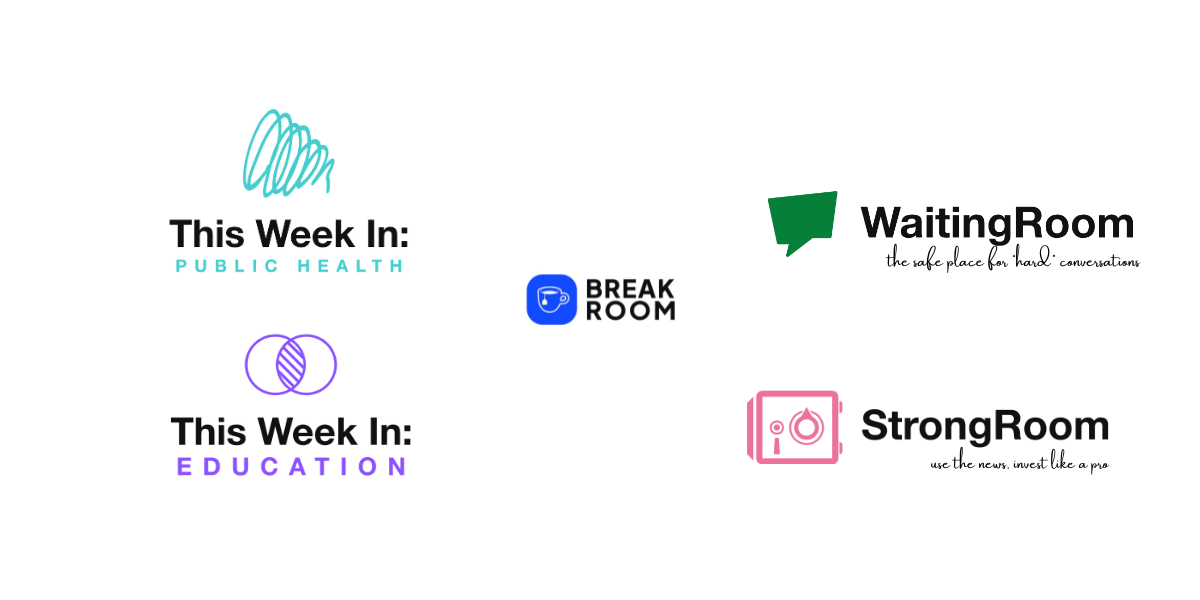Asking and answering the tough questions
Lots of civic engagement witnessed online over the past week as people educate each other on different aspects of the Finance Bill. There's hope as patients living with chronic illness are catered for in the new Social Health Insurance Fund (SHIF) and a new drug tested in Uganda prevents 100% of HIV infections.
Here are the main stories in Public Health this week:
- Sh.11bn budget cut for Ministry of Health
- Digital health central to patient service delivery
- Medic heroes attend to everyone during protests
In this edition
SPOTLIGHT: What is the new Social Health Insurance Fund (SHIF)?
HEADLINES: Top 3 stories in Public Health this week
INSIGHT: Innovating beside government officials
PAUSE: The BreakRoom
NEWS: More stories in Public Health this week
QUICK: Other stories worth a mention
REGION: Top stories across the region in Public Health
EXTRA: Understand your brain, think for yourself
SPOTLIGHT
What is the new Social Health Insurance Fund (SHIF)

The Social Health Insurance Act (SHIFA) [download] was assented to in October 2023 to establish three new funds: the Primary Healthcare Fund, the Social Health Insurance Fund (SHIF) and the Emergency, Chronic and Critical Illness Fund (ECCIF).
SHIF was proposed to ensure equitable access to healthcare by covering those left out by the National Health Insurance Fund (NHIF). While we used to pay sh.500 per month for NHIF, everyone is expected to contribute 2.75% of their income to SHIF. However, last week's Finance Bill amendment has excluded this tax.
Some of the tariffs in the new scheme include:
- Sh11,200 for normal deliveries and Sh32,600 for C-Section.
- Prostate cancer screening for men over 55 years, colon cancer screening in males over 40 years and cervical cancer screening for women between 30 and 50 years.
- Three sessions per patient for those with kidney failure and dialysis at Kshs10,650 per session.
- Sh.1,200 per visit for inpatient services for mental illnesses and at Levels 4, 5, and 6 is Sh3,500, Sh4,000 and Sh5,000 respectively. There's a tariff of Sh125,00 for rehabilitation.
SHIF rollout
SHIF will replace NHIF and continue providing existing benefits schemes until the NHIF contracts end and its board winds up the Fund in one year. The new ECCIF exists to cover treatment costs of chronic illnesses after an individual maxes out their SHIF. The National Assembly, grants, gifts and donations shall fund it.
SHIF caters to a broader range of services and includes people living with chronic illnesses who often reside in the medical system. A plan is only as good as its execution, as the Competency-Based Curriculum (CBC) has been faulted for research gaps evidenced in its rollout. All eyes are on the Ministry of Health now.
HEADLINES
The week's main stories
- Sh.11bn budget cut for Ministry of Health: Treasury CS Njunguna Ndung’u has allocated sh3.7 billion for medical interns, a key demand from the recent doctors' strike. And sh4.6 billion for stipend and acquisition of specialised equipment for community health promoters who speed up patient diagnosis.
- Digital health central to patient service delivery: Innovation head at the Ministry of Health, Dr Wamicwe, championed the Digital Health Act at the recent HIV Service Delivery Summit. It provides a framework for e-health services, establishes an integrated e-health management information system and protection of personal health information.
- Medic heroes attend to everyone during protests: A team of medics set up at The Jamia Mosque in Nairobi's CBD to treat cuts, dizziness, fractures and tear gas inhalation during the protests held last week. Dr Austin Omondi says, "We put our numbers out there and asked anyone injured, whether they are police officers or Kenyans, to come here. We have at least 100 medics here and about 2,000 in different parts of the county." After striking for 56 days earlier in the year, medics can teach us how to navigate life during and after protests.
INSIGHT
Innovating beside government officials
I'm a firm believer in nurturing dissatisfaction with flawed processes, it's necessary for triggering lasting change. Depending on the players involved, meaningful progress can take days to years but you must start somewhere.
While covering the doctors' 56-day strike in May, I was also advocating for better working conditions. Once I secured the attention of the stakeholders likely to implement change, I proposed a workable solution.
This mirrors the mandate by the Labour Relations Court to end the strike in 48 hours which yielded a return-to-work formula between the medical union and the government — you can follow its implementation here. After an arduous month, I secured an accountability process that helps everyone navigate future disputes.
Present day
People are questioning Nominated Senator Gloria Orwoba's commitment to ending period poverty after she was spotted with President Ruto amidst the finance bill protests. Although the eco levy proposed in the Finance Bill 2024 no longer applies to locally manufactured pads, the manufacturers she vouches for reportedly produce low-quality pads. Thus, local pad companies like Binti Pads that design their products and outsource manufacturing will still incur import costs passed on to the buyer.
Emmy Chepkirui, a lawyer, engaged with Gloria's LinkedIn post over quality issues and sparked a good debate in the comment section.
If our Kenyan products like the sanitary towels then are substandard, what can make the local pads more appealing to Kenyan ladies? We have very creative minds that can work around it....I think as long as something is functioning very well,it will be about value for money and we Kenyans can buy them in lots. Can some local Kenyan businessmen and women be sponsored....free of charge kabisa, to go and benchmark in China, Germany etc on how to make quality pads? Exchange of trade can also be done in ideas, not imports and exports only.
My next steps
I'm reviewing the FinanceBill [download] and using the Finance Bill GPT and legal pages as complimentary resources. It's a lengthy document so my first learner goal has been to understand how the bill impacts healthcare; doctors, medical facilities, medical equipment, SHIF, medications and health-related products like pads etc. That way, despite the fate of the bill, I can take action from an informed place in the coming months.
PAUSE

NEWS
What else we learned
- Although more men are using self-testing HIV kits, many fail to present results for diagnosis at the hospital. Meanwhile, the CS of Health is calling for an end to stand-alone HIV clinics to reduce the stigma associated with seeking treatment.
- The Stop TB Partnership has called on the government to begin TB screening in schools to mitigate the current spike in TB cases. Amref is using a sh154m AI programme to upgrade equipment in 55 hospitals across the country to improve the detection of lung diseases thanks to the Global Fund.
- A doctor's instincts kept her and her baby from succumbing to placental abruption and she shares the importance of blood donations in such scenarios. "Had I not followed my instincts, I may have required an infusion of life-saving blood to keep my daughter and me alive. Anyone who voluntarily donates blood could be someone's hero," Dr Ida Mbuthia notes.
QUICK
One-liners
- Varsity inks deal with KU hospital to enhance medical research and training [The Star]
- WHO warns of urgent need for innovative antibiotics despite pipeline growth [The Standard]
- Dr Patrick Amoth is CS Nakhumicha’s choice as new Health Director General [Business Today]
- Faith leaders join push for HPV vaccine uptake [The Standard]
- Vihiga Enhances Maternal, Newborn Healthcare Systems [Kenya News Agency]
REGION
What's happening next door?
[UG] Ugandan scientists welcome twice-yearly injection against HIV: 10 years later, Lenacapavir, an injectable administered every 6 months to prevent HIV infection is 100% effective. "Zero infections in over 2000 adolescent girls and young women in Africa is a home run!" said Dr Flavia Matovu, Uganda's national principal investigator for the PURPOSE 1 Study. [New Vision]
[UG] Busoga parents celebrate as Jinja Hospital performs first-ever pediatric cardiac surgeries: Uganda Heart Institute and Jinja Regional Referral Hospital facilitated free life-saving procedures for eight children marking a significant step towards decentralizing critical heart care services. [Nile Post]
[TZ] Tanzanian student's startup, Primetel, revolutionises healthcare access in rural areas [The Citizen]
[TZ] Transforming newborn care in Tanzania: Phase 2 of The Newborn Essential Solutions and Technology (NEST360) will invest sh.9.9 billion to build 25 more hospitals and improve equipment procurement and healthcare provider training. [The East African]
[RW] Kagame — Africa should aim for new vaccines [New Times]
[RW] Rwanda gets largest medical diagnostic equipment delivery under new strategy: The batch includes computerised CT scanners, fixed X-rays and mobile X-ray machines, mammography machines used to examine the breast for the early detection of cancer and ultrasound machines. [New Times]
[SA] HPV vaccination switching to single-dose and private schools to get government supply: The South African government aims to increase HPV vaccination coverage to 90%. In 2022, WHO validated the switch to one dose and a trial in Kenya demonstrated the effectiveness of single-dose in preventing HPV infections over an 18-month study [Spotlight]
EXTRA
Understand your brain, think for yourself
In this video, Dr. Jill maps out the cognitive and emotional parts of our brain that make us who we are. Right now creating individual then collective frameworks to act on emerging information can make our activism more sustainable. For instance, introducing stakeholders to each other through this newsletter has seen this audience discover a local affordable pad company, Binti Pads, that they can immediately support.
I'm reflecting on what I call the "layers of justice" — life after protesting and some of your demands are met. As doctors implement their return-to-work formula what's the plan during and after current protests? Self-education is a great place to channel our emotions and turn them into informed actions. That's what BreakRoom is here for.
Thank you for your time and feedback on the last edition of This Week In Public Health.
"Interesting piece on the health area. Learned a lot. Keep up the good work."
